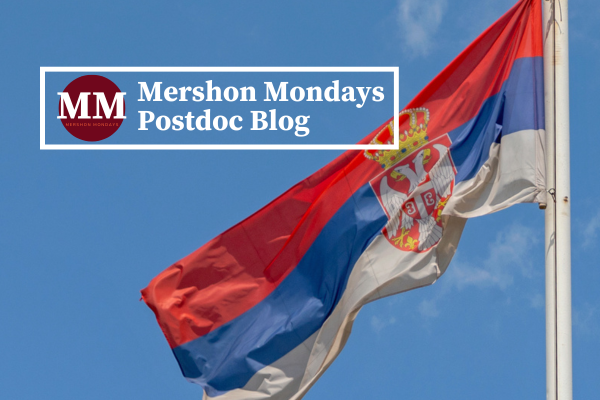Richard Herrmann on Identity Attachments in Serbia

On our Mershon Monday on October 21st, we had the pleasure of hearing Richard Herrmann, Professor Emeritus in the Department of Political Science, discuss his recent research on national and transnational identity in Serbia. In autumn 2023, he and Nikola Jovic (University of Belgrade) conducted a U.S. Department of State-funded survey among a nationally representative sample of Serbs. The aim of the survey was to determine where respondents placed themselves and their national identity vis-à-vis the East-West axis central to the 21st Century Cold War and how this correlated with their perceptions of contemporary geopolitics and economics.
Herrmann explained that Serbia, situated as it is between the East and West, formed an instructive case study for this project. Historically, Yugoslavia was part of the Non-Aligned Movement, which has continued to influence Serbia’s current foreign policy. At the same time, the country faces different incentives for foreign policy alignments, with economic ties to the European Union and historic and contemporary cultural connections with Russia and the Slavic geopolitical sphere. Current president Aleksandar Vučić has adeptly balanced geopolitical pressures by chartering new agreements with key EU states, such as France, while maintaining strong ties with Russia and China.
As this background might suggest, the survey found that Serbs were genuinely divided in how they viewed the country’s transnational identity. While most respondents expressed a strong feeling of national identity, they differed substantially in whether they saw the country as belonging primarily to the East or to the West. Significantly, Herrmann and Jovic found strong evidence that this identity attachment structured how contemporary conflicts were perceived. For example, Serbs who aligned their identity with the East were far more likely to see Russia’s military engagement in Ukraine as defensive rather than offensive, and vice-versa. This identity alignment also impacted participants’ views on economics: Western-aligned Serbs evinced negative attitudes to economic agreements with Russia or China and positive ones towards Europe and the United States. Those identifying with the East showed the opposite preference.
The implications of these findings are manifold, and significant for our understanding of how identities shape political and economic preferences. It is commonly assumed that economics are driven by self-interest, but the findings of this survey suggest that our perceptions of self-interest are, at a minimum, heavily influenced by patterns of identity-related motivated reasoning. Equally, Herrmann and Jovic’s research complicates the constructivist narrative that norms can restrain and dissuade undesirable political action: as they find, theoretical agreement that a norm exists does not preclude divergent perceptions of the same event, as Serbs’ differing views on Russia’s invasion of Ukraine exemplify.
If you are interested in learning more about the implications of Serbs’ transnational attachments, Herrmann will be speaking about further findings from this survey at the Research in International Politics session on November 15. The title of this session is ‘Advantages of affinity and the costs of enmity: How identity dispositions motivate popular reactions to commercial deals with foreigners, a Serbian case study’; it will focus on the economic consequences of Serbs’ identity alignments. The event will run from 1-2:20pm in the Spencer Room (Derby 2130).
Mershon Monday Story by Postdoctoral Scholar Helen Murphey, in collaboration with colleagues Julia Marino and Nicholas Nyachega.
